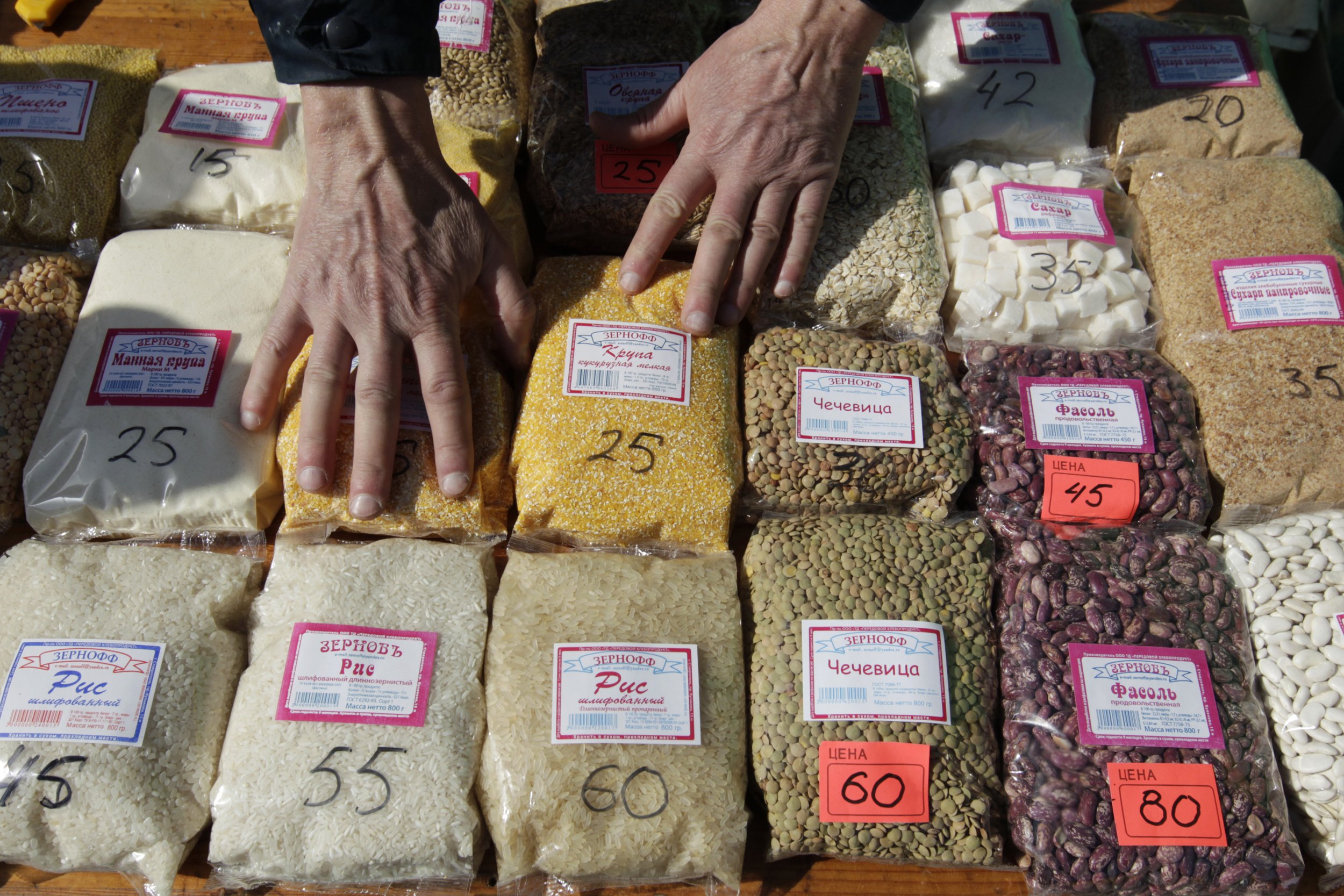
"Liberty cabbage." "Freedom fries." And in Russia there is now "Crimean Butter," a new cheese brand introduced to consumers after the annexation of Sevastopol by the Russian Federation last spring.
Such nationalistic kitsch has been appearing in Russian stores since 2014. What is disturbing about these products is not the jingoism on display but the reality of scarcity of products in grocery stores.
How did it come to this? The current crisis has been partly driven by the government's policies, partly by global factors beyond its control—but it has been a long time coming due to the shaky ground the Russian economy has been built upon for over the past fifteen years.
Yet predictions that milk and bread lines will be the end of Vladimir Putin remain premature. Russians do not have many ways to hold the government accountable, and a vocal number of them are willing to accept the situation as it is because "it could be worse."
"Reimagined" and derivative food products are replacing imported produce in Russia. The government has banned them in response to Western sanctions against certain Russian politicians, defense companies and banks. Food prices are rising as a result as Russia struggles to fill the gap with its own produce and imports from Turkey and growers in Southeast Asia and Latin America.
Items like chocolate are becoming luxury items, to say nothing of the increases on basic grains and meats. Beyond people's stomachs, other numbers are even less encouraging: a flat GDP growth of 0.4 percent for 2014, and -0.8 percent for 2015 according to STRATFOR.
Plummeting oil prices and a run on hard currency reserves have exposed just how little the government invested for a "rainy day" when energy markets were in Russia's favor until recently. For the EU, the imports ban has caused considerable consternation among farmers and agribusiness lobbies, with losses across member states hovering around $16 billion. (Russia, imports $40 billion worth of food annually.)
There is pressure to reduce sanctions to resume normal trading ties with Russia. But Russia's economic wounds are so deep that the resumption of trade or higher energy prices will not reverse downward trends. The extractive economic model Russia has practiced is showing its limits. As economist David Dyker noted in 2010, "One of the outstanding characteristics of the Russian economy over the decade of transition has been the lack of structural change."
Yet over and over, consumers seem eager to stand by their leaders and buy what is available on the shelves, only raising their voices occasionally in protest over lowered living standards. Do they not blame the government for the economic downturn? Since "even a hint at a specter of food shortages from the late 1980s would be extremely undesirable for the Russian authorities," is Putin simply insulated from such discontent?
No. Russian voters are not fools. Russian officials, not EU ones, emptied the shelves of Polish apples and American pork. They recognize that things are not getting better for them, and they are not blessed with some unique strain of stubbornness that makes them "endure" shortages and decreased purchasing power without complaint.
Russia's wealthiest men and women are even more acutely aware of how their declining fortunes are not just the result of sanctions, but also the lack of insulation from shocks in global markets.
But even the "inner circle" of oligarchs are easily shouted down. One need not look far back to be reminded that those who shout back suddenly find themselves unable to do business in Russia. They are also far too complicit in the scandals of the 1990s and 2000s that Putin and his team inherited to speak freely on economic matters.
So long as the Kremlin can balance enough of this grumbling with results that benefit a few segments of society, Putin remains "safe." The Russian government continues to subsidize money pits in the industrial sector so that people will not lose their jobs. Moves like these do insulate the government from more serious popular discontent.
Whether they are holiday vacationers, shipbuilding concerns or even mob bosses, as long as enough people continue to make enough money to support themselves, Putin is unlikely to face either a palace revolt or mass demonstrations on the streets.
Paul Mutter is a graduate student at NYU pursuing an M.A. in international affairs. He is a blogger for the Foreign Policy Association. This article first appeared on the Foreign Policy Association site.
Uncommon Knowledge
Newsweek is committed to challenging conventional wisdom and finding connections in the search for common ground.
Newsweek is committed to challenging conventional wisdom and finding connections in the search for common ground.
About the writer
To read how Newsweek uses AI as a newsroom tool, Click here.








